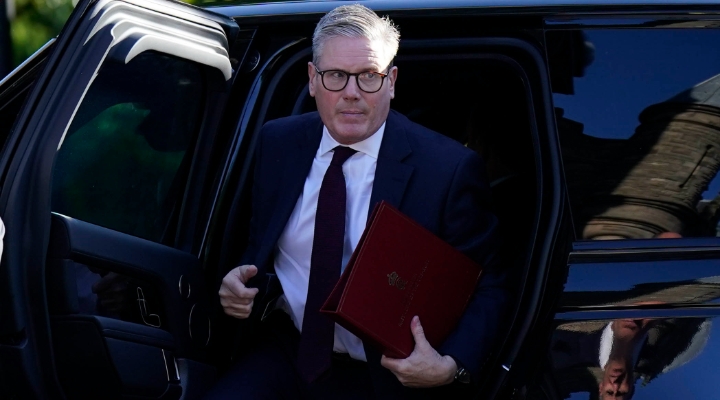.jpg)
The Chancellor delivers his annual Budget on Wednesday. What should savers and investors expect from this key event in the personal finance calendar?
As recently as 2016, the UK's chancellors were prone to relying on the proverbial "rabbit out of the hat" to drum up confidence in their Budgets on the day. But things have changed.
Now, amid a fear of annoying middle Britain (and right-wing Tory backbenchers), and the long-standing memory of Budgets gone wrong (see the Omnishambles Budget of 2012, or Liz Truss's own mini-Budget disaster), our leaders have taken to testing the political waters before they deliver their statements. Normally this comes via convenient leaks to newspapers badged up as "scoops" by intrepid personal finance reporters and their editors.
This has its benefits. On the upside, it allows time for pre-Budget U-turns, which tend to be forgotten in the hubbub that follows. This has long been the case with pension tax relief changes, which have featured in far fewer Budgets than journalists will have led you to believe beforehand. Likewise, inheritance tax (IHT), which the Treasury reportedly considered cancelling last year. But the policy never appeared.
But the drawback is huge. Namely, it makes chancellors vulnerable to the commentariat deciding what Budgets should be about before they are even delivered.
This week's pre-election Spring Budget is another such affair. And everyone seems to agree. Regardless of what Jeremy Hunt wants you to think, it's all about tax.
Why is The UK's Tax Burden so High?
A number of factors mean that the UK's so-called "tax burden" is at a record high.
For one, the pandemic unleashed an almost-unprecedented level of peacetime government spending to shore up people's personal finances amid potential layoffs and at-times massive market pessimism. On that latter point, more later.
But the other is inflation and the concept of "fiscal drag". In a bid to look taxpayer-friendly, the government froze certain tax thresholds until 2028. But that is a taxing measure. Here's how that works.
"Freezing tax thresholds increases people’s taxable income without nominal tax rates actually increasing," the House of Commons Library says.
"This results in additional revenue to the government. This phenomenon is called 'fiscal drag', as more taxpayers are 'dragged' into paying tax, or into paying tax at a higher rate."
The impact of fiscal drag depends on three factors. Firstly, what the UK's tax allowances and thresholds actually are, inflation itself, and any consequential rise in wages. In a higher inflationary environment, people can very easily feel like they are paying more and getting less. And that's because they are.
Will The Chancellor Cut Taxes in The Budget?
As you would expect, Jeremy Hunt knows all this. And he knows he's under huge pressure to lower tax. Speaking on The Laura Kuenssberg Show yesterday, he purposefully highlighted he wanted to show a way to a lower-tax economy.
It's just there's one problem. There is limited "fiscal headroom" to do so.
"Fiscal headroom" is the term used to describe the independent Office for Budget Responsibility's ongoing assessment of the relationship between a) current UK gross domestic product projections; b) the impact of that on the tax take; and c) the capacity that gives a chancellor like Hunt to spend on new projects without raising borrowing.
At the moment, it's thought the government's current headroom is around £13 billion, far lower than the more optimistic picture that was presented at the start of 2024.
Remember too: one of the government's self-imposed fiscal rules is getting the country's debt-to-GDP ratio falling within five years. Andy Haldane, the former chief economist at the Bank of England, thinks that rule is stifling government investment for the long-term, but Jeremy Hunt is determined to keep it, lest people think the Treasury has lost control of its finances. The memory of Liz Truss's unfunded spending plans still looms large. As ever, the chancellor is doing everything with one eye firmly on the markets and the FTSE 100, which this week has opened momentarily up, before Budget optimism once more dissipated.
Will National Insurance Contributions Be Cut?
Huge tax announcements are therefore unlikely. One option reportedly mulled by the chancellor is a 1p cut to Class 1 National Insurance Contributions (NICs), following the scrapping of Class 2 NICs at the Autumn Statement last year, which came into effect this January.
Gary Smith, partner in financial planning at wealth management firm Evelyn Partners, explains the real-terms impact of this latest policy development.
"A 1p cut would amount to an extra £74 a year for someone on £20,000 a year, £274 for someone on £40,000, and £377 for higher and additional rate taxpayers," he says.
"The median employed earner on £28,000 a year gross would receive an extra £154 a year – or £12.80 a month. These amounts would double for a 2p cut, and it's true that, added to the 2p cut that kicked in in January, that would constitute a substantial tax cut, albeit one focused on workers and which will not benefit those who pay income tax but not NIC.
"For many taxpayers, though, snips to NICs either won't apply or will be fighting against a rising tide of income tax and other direct taxation of capital gains, dividends, business profits and inheritances."
2023 Budget and Autumn Statement Key Events
• Autumn Statement: the Main Tax Changes
• Budget 2023: Lifetime Allowance Scrapped
What is The Great British ISA?
A second possible policy to emerge on Wednesday could be the so-called "Great British ISA".
Another one to have almost made it into the Autumn Statement last year, the idea has become no less controversial in the five months that elapsed since Hunt last stood at the despatch box with fiscal news.
There are various theories about how this could work, but the main one relates to the UK's ISA allowances. The headline allowance for ISA contributions is currently £20,000 per tax year, so savers can put that maximum amount across several different types of ISA accounts (cash, stocks and shares, for instance) over 12 months. Those with a Lifetime ISA may only put £4,000 per tax year in that kind of account, however.
With the patriotically-branded Great British ISA, the government might open up a separate sub-allowance to encourage people to invest in UK-listed equities via their stocks and shares accounts. Or it could create an altogether separate product with an allowance of its own. The reaction to both pieces of thinking has been decidedly mixed.
"Ringfencing the stocks and shares ISA so it is solely focused upon UK quoted companies (as opposed to global quoted companies as at present) should be enough to light the blue touch paper,” says an optimistic Gervais Williams, fund manager of Premier Miton's Diverse Income Trust.
"Even a slight change in capital flows has the potential to drive up UK share prices from their overlooked valuations, so they break out on the upside a bit like Japan. A follow on will be renewed interest from international investors, as they suddenly appreciate our unusually low valuations."
But beyond a short-term bounce, the longer-term impact may not be as exciting. Some even go so far as to call it "risky" given the effect of so-called "home bias", explained here by Ian Tam, Morningstar's director of investment research for Canada.
Investor Home Bias
Tom Stevenson, investment director for personal investing at Fidelity International, says using the levers of government to increase UK investors' "home bias" is unlikely to have the effect policymakers intend.
"Investors opt for local assets for a number of reasons. They assume they have more information about their home market. They view foreign assets as riskier. In the past, regulation and transaction costs have made overseas securities less attractive. None of these arguments makes much sense anymore," he says.
"Tilting your portfolio to the UK also creates sector and style risks. Around half the value of the FTSE All Share index is accounted for by just three sectors – financials, energy and consumer staples. The UK market is a big bet, too, on the value investment style and away from growth and momentum. Historically this has outperformed. More recently it has not.
He continues:
"A Great British ISA will [also] be challenging to deliver in a way that achieves its objectives.
"There are other ways in which the government could raise potential returns for investors and at the same time support companies that are considering listing in the UK. It could remove or reduce the burden of stamp duty for equity transactions, putting us on a level footing with other markets.
"It might also consider reducing the tax rate for UK dividends, simplify capital gains tax or reintroduce indexation to encourage longer-term investing. That's less eye-catching than a Great British ISA perhaps, but it might lead to a better outcome."
Will The Government Scrap Non-Dom Status?
Anyone with a long political memory will recall just how badly Labour's proposal to scrap "non-dom" status went at the 2015 election, when a bemused then-shadow chancellor Ed Balls was caught red-handed in footage shot just months before arguing that he didn’t actually think scrapping the special tax status would lead to a higher tax revenue at all.
Since then, non-dom status has become even more controversial. As a tax policy, it allows individuals who live and work in the UK – but are not officially domiciled here – to avoid paying tax on their overseas income. Among those to have previously enjoyed non-dom status are former Bank of England governor Mark Carney – a Canadian national – but also the prime minister's own wife, who holds sizeable business interests in overseas businesses.
Despite the proverbial balls-up in 2015, canning non-dom status is very much Labour territory, so any action on this matter this Wednesday would very much represent an effort by the Tories to park their tanks on Labour's lawn ahead of the big vote later this year.
For its part, the Labour Party has tried to spin this potential outcome positively, claiming it would represent "abject humiliation" for a chancellor it claims is out of ideas. But that, as they say, is politics. Apart from the obvious impact on the tiny minority of people who occupy the tax status, the day-to-day impact on UK investors would be minimal.
How Will The Election Affect You, The Investor?
But this is all wrangling. And it may be for nothing.
Indeed, elections tend to cancel out Budget policies, or at the very least lead to, er, more Budgets. On that, there is very recent precedent indeed. The Tories didn't expect to win a majority in 2015, but they did, and that meant another Budget when George Osborne returned to the Treasury following the shock news of a majority Conservative result.
On that, heed the wise words of Institute for Fiscal Studies director Paul Johnson, who says any tax cuts in the Budget this week are "likely to be undone after the next election, whoever wins." Autumn Budget, anyone?











.jpg)
















